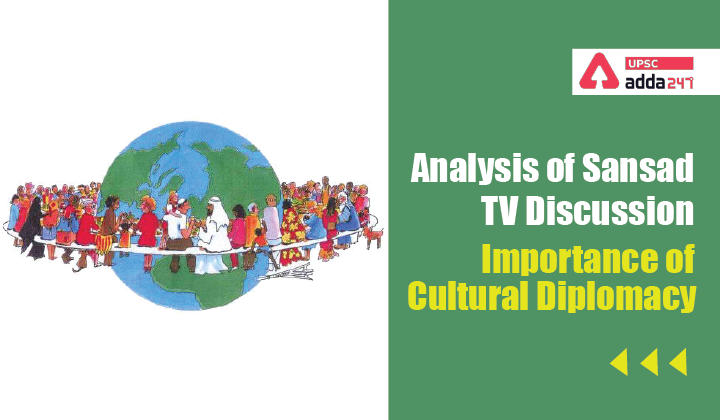Table of Contents
Context
Recently, India has been elected to serve on the United Nations World Heritage Committee for a four-year term beginning this year.
About UN World Heritage Committee
- The Committee is responsible for the implementation of the World Heritage Convention, defines the use of the World Heritage Fund and allocates financial assistance upon requests from States Parties.
- It has the final say on whether a property is inscribed on the World Heritage List.
- It examines reports on the state of conservation of inscribed properties and asks States Parties to take action when properties are not being properly managed.
- It also decides on the inscription or deletion of properties on the List of World Heritage in Danger.
What is Cultural Diplomacy?
- Cultural Diplomacy may best be described as a course of actions, which are based on and utilize the exchange of ideas, values, traditions and other aspects of culture or identity, whether to strengthen relationships, enhance socio-cultural cooperation, promote national interests and beyond.
- Cultural diplomacy can be practised by either the public sector, private sector or civil society.
Importance of Cultural Diplomacy
- In an increasingly globalized, interdependent world, in which the proliferation of mass communication technology ensures we all have greater access to each other than ever before, cultural diplomacy is critical to fostering peace & stability throughout the world.
- Cultural diplomacy, when learned and applied at all levels, possesses the unique ability to influence the “Global Public Opinion” and ideology of individuals, communities, cultures or nations.
Principles of Cultural Diplomacy
- Respect & Recognition of Cultural Diversity & Heritage.
- Global Intercultural Dialogue.
- Justice, Equality & Interdependence.
- The Protection of International Human Rights.
- Global Peace & Stability and civilization.
The Indian Council for Cultural Relations (ICCR)
- ICCR was founded in 1950 by Maulana Abul Kalam Azad, independent India’s first Education Minister.
- Its objectives are to actively participate in the formulation and implementation of policies and programmes pertaining to India’s external cultural relations; to foster and strengthen cultural relations and mutual understanding between India and other countries; to promote cultural exchanges with other countries and people, and to develop relations with nations.
- The Government of India through the Indian Council for Cultural Relations (ICCR), has been expanding cultural diplomacy around the world vide its activities in various fields including inter-alia, the teaching of Yoga, Dance, Music and Hindi; sponsoring visits of performing art groups; organizing Indian festivals; hosting foreign cultural groups; organizing/supporting conferences /seminars /workshops in various fields, promotion of Yoga & Ayurveda including the celebration of International Day of Yoga; supporting Chairs of Indian Studies in various foreign universities; offering scholarships to foreign students to study in India; hosting eminent academicians/distinguished visitors in India; gifting of busts/statues of Mahatma Gandhi and other national heroes; exchanging visual art exhibitions.
India’s Cultural Strength & Cultural Diplomacy
- India is fortunate to have all the major religions of the world. Four are homegrown: Hinduism, Buddhism, Jainism and Sikhism. Four came from outside: Zoroastrianism, Judaism, Christianity and Islam. This adds to the incentives for religiously minded foreigners to visit India.
- The international media coverage of the Khumbmela is testimony to the admiration of other countries for India and how it has kept up its beliefs and traditions over millennia.
- Religious tourism into India is a major factor in our external relations. Apart from Hindu religious sites like Varanasi, Badrinath, Kedarnath, Vaishno Devi, Amarnath, Tirupathi, Sabarimala, Tanjavoor, Madurai etc., a large number also come for places of interest to other religions.
- India is the most favoured destination for Buddhist pilgrims. This is not surprising because most of the places associated with Lord Buddha’s life are in India.
- Throughout the year, there is a steady stream of visitors from the ASEAN countries, Japan, Sir Lanka and Myanmar to Bodh Gaya and Nalanda.
- Christianity and Judaism in India are also very old and there are historic Churches and Synagogues in South India.
- Speaking of Islam, the Dargas of Sufi saints like Moinuddin Chishti and Nizamuddin Aulia attract thousands of devotees.
- Connected to religious aspects of India are Yoga and Meditation, which have become household terms in most countries.
- Equally important are the music, dance, art and architecture of India.
Objectives of India’s Cultural Diplomacy
International cultural policy focuses on the following objectives:
- Helping leading Indian art and culture institutions achieve international standards, by making considered choices within the basic cultural infrastructure
- Strengthening the international market position of Indian artists and institutions; handicrafts; ethnic arts and indigenous cultural industries of India
- Strengthening Indian economic interests by emphasizing cultural, trade and economic ties; ease of access pertaining to export and outsourcing
- Using art and culture to benefit international relations.
- To participate in the formulation and implementation of policies and programmes relating to India’s external cultural relations.
- To foster and strengthen cultural relations and mutual understanding between India and other countries.
- To promote cultural exchange with other countries and peoples.
- To establish and develop relations with national and international organizations in the field of culture.
- To take such measures as may be required to further these objectives.
Conclusion
There is no country in the world today, which does not attach importance to Cultural Diplomacy. India is in a good position in this respect due to its enormous resources that come in handy in increasing the country’s attractiveness to others. Academics and intellectuals can play a critical role in this endeavor.



 TSPSC Group 1 Question Paper 2024, Downl...
TSPSC Group 1 Question Paper 2024, Downl...
 TSPSC Group 1 Answer key 2024 Out, Downl...
TSPSC Group 1 Answer key 2024 Out, Downl...
 UPSC Prelims 2024 Question Paper, Downlo...
UPSC Prelims 2024 Question Paper, Downlo...




